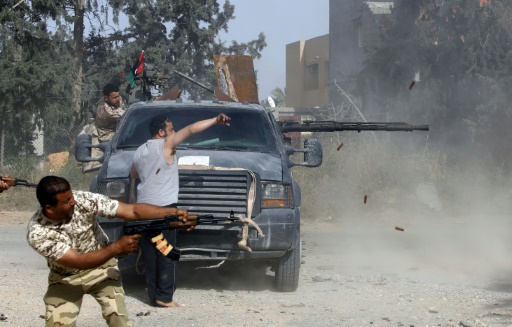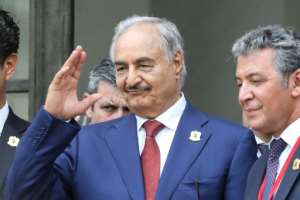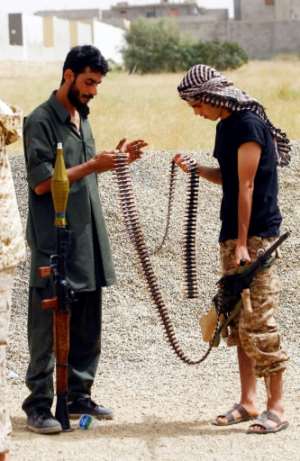
[ad_1]
Libyan Prime Minister Fayez al-Sarraj, head of the international government recognized in Tripoli, angrily denounced France on Wednesday for his support of rival Khalifa Haftar, highlighting the recent growing diplomatic tensions in the region.
Speaking in the French daily Liberation, Sarraj denounced Paris' support for a "dictator" in his most severe criticisms to date on French diplomacy.
France has long been suspected of supporting Haftar, a former army marshal based in eastern Libya, who heads the Libyan National Army (LNA) and has gradually expanded its territory.
On April 4, Haftar launched a campaign for Tripoli, home to the UN-recognized Sarraj government, which led to clashes that claimed the lives of 264 people and left more than 1,200 wounded.
"We are surprised that France does not support a democratic government, but a dictator," Sarraj told Libération.
"When French President Emmanuel Macron called me, I warned him that public opinion was against France." We do not want Libyans to hate France. positive to play, "he said.
In another interview Monday at Le Monde newspaper, Sarraj said France was partly responsible for Haftar's offensive on Tripoli.
"France's disproportionate support for Haftar is what prompted it to decide to act and abandon the political process," he said.
France publicly denies its support for Haftar, claiming to have contacts with all the actors of war-ravaged Libya, where a complex mosaic of militias and political factions are fighting for the advantage.
"A big shock"

Last year, Khalifa Haftar took part in a major peace conference of various Libyan factions in Paris, which also legitimized him on the international scene. By Ludovic MARIN (AFP / File)
France has long had links with Haftar, invited to Paris alongside Sarraj in 2017, in an ambitious challenge presented by Macron shortly after his election as president.
This marked the beginning of Haftar's appearance on the international scene and last year he was invited to a major peace conference of the various factions in Paris, which legitimized him.
"The two invitations of President Macron have completely changed the image and positioning of Haftar," AFP Virginie Collombier, a Libya-based university professor at the European University Institute in Florence, told AFP.
The bold move of the strong man in Tripoli, three weeks ago, seems to have taken the international community by surprise, but she raised questions about a possible French complicity – an idea firmly rejected by Paris.
"It was a shock," said a diplomatic source at the Foreign Ministry, saying France had "no prior knowledge" of the offensive.
The Haftar campaign began just two weeks after French Foreign Minister Jean-Yves Le Drian met him in his eastern stronghold of Benghazi during a ministerial trip during which he had also met Sarraj.
"High stakes case"
Michel Duclos, former ambbadador and advisor of the Paris-based think tank, Institut Montaigne, said the April offensive was a "shocking rejection" of French support.
"In terms of the image, it is a very ambitious case for French diplomacy, which has given the impression in recent years to compromise with a dictator in the making", he wrote in an information note.

The fighting erupted after Haftar's forces began moving to Tripoli on April 4, prompting forces loyal to the nationally-recognized, internationally recognized government to retaliate. By Mahmud TURKIA (AFP)
"This risky attitude could be justified if it allowed to transmit to Marshal Haftar messages that stop the fighting."
Collombier of the European University Institute said that the proximity of France with Haftar meant that she had "lost all credibility with some actors in Libya" and that she had also caused tensions in the country. Italy, his partner.
Rome reacted furiously at what Macron sees as a powergrab in Libya, a former Italian colony, according to diplomats.
Speaking in Paris on Wednesday, Le Drian urged Sarraj and Haftar to "keep to the agreement" reached in Abu Dhabi in February, referring to talks between them during which they have agreed to organize to hold elections.
A bulwark against Islamists?
French diplomatic sources have already expressed concerns about Sarraj 's apparent lack of influence and alleged dependence on Islamist militias and the Muslim Brotherhood.
He is supported by Qatar and Turkey, according to badysts.
Haftar is increasingly perceived by its allies, including Russia and Egypt, as a bulwark against Islamists who have gained a foothold after the 2011 uprising that overthrew dictator Moamer Gaddafi.
Haftar also won the support of US President Donald Trump last week.
The White House said Trump "recognized the important role of Marshal Haftar in the fight against terrorism and securing Libya's oil resources" during a phone call between the two men.
That happened a day after Russia and the United States opposed the UK's bid for the United Nations Security Council, backed by France and Germany, to demand a cease-fire in Libya.
Source link